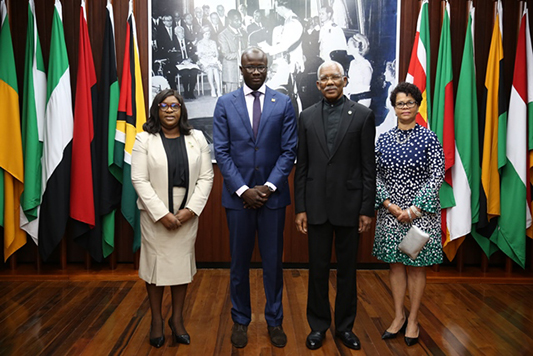President David Granger yesterday accredited Ebu Rohno Jones as the Ambassador of Suriname to Guyana.
During his address at a simple ceremony held at the Ministry of the Presidency, Granger emphasised government’s commitment to the promotion of good neighbourly relations and peace. He reminded that the two countries are bound by bonds of geography, history and mutual interests.
“Our relationship is founded on mutual respect for each other’s territorial integrity and sovereignty, mutual noninterference in each other’s international affairs, cooperation for mutual benefit, respect for treaties and international law and the maintenance of regional peace and security,” he said.
Guyana and Suriname have had uneasy relations over border matters for decades, highlighted in the year 2000 when Surina-mese gunboats evicted a rig that was drilling for oil from Guyana’s waters. Guyana later lodged a case with the International Tribunal for the Law of the Sea which it won.
The president asserted that the preservation of regional peace and security is vital to protecting both countries’ common interests and stressed that Guyana is committed to ensuring that the Caribbean and the South American continent remain a zone of peace. Peace in the region, he said, could be endangered by transnational threats such as trafficking in illegal weapons, narcotics and people, illegal migration, money laundering, environmental hazards and territorial controversies. The latter remark would be seen as a veiled reference to Guyana’s border controversy with Venezuela.
Granger said too that Guyana and Suriname have collaborated in the fields of agriculture, culture, environment, fisheries, forestry, health, mining, security, trade and transportation, and looks forward to working with its neighbour within the ambit of the Caribbean Community and the Guyana-Suriname Coo-peration Council, to continue to improve trade, to intensify cultural, economic, environmental and social cooperation, and to combat transnational threats.
Reminding that Guyana is moving towards the establishment of a “green” state, he said that this will place emphasis on the protection of the environment, the preservation of biodiversity, the promotion of renewable energy, and the adoption of practical measures to ensure adaptation to climate change.
Further, he said that given both countries’ high levels of forest cover, environmental cooperation between Georgetown and Paramaribo “could become a model for the protection and sustainable management of our forests and their biodiversity.”
He told Jones that his appointment provides an opportunity to consolidate cooperation between the two Republics and to continue to promote neighbourly relations.
Jones, for his part, emphasised collaboration to maximise the full potential of the two countries and expressed his country’s desire to help Guyana in developing the oil and gas industry.
He said that the bilateral meetings between Guyana and Suriname after his President Desiré Bouterse took office in 2010, resulted in the revitalisation of the Cooperation Council consisting of representatives from both countries.
“The cooperation between our countries, given the diverse and regional nature of it, is of strategic importance for the development objectives of our nations,” Jones said, before adding that it is important and necessary that the atmosphere of peace, togetherness and friendship is sustained.
According to Jones, his president is convinced that there is even more potential for cooperation in the sustainable use of natural resources, as well as exploring the environmental, tourism and agriculture opportunities both countries have to offer.
In addition, Suriname also looks forward to deepening the cultural relationship and intensifying economic trading activities, he said.
With regards to oil and gas, he informed that his country has over 40 years of experience in this industry and is willing to share this knowledge with Guyana.
“In furtherance of my inauguration, the mandate that I’ve received from the President, is to exert all efforts to ensure that our bilateral relations are being taken to greater heights, as well as the improvement of the communication between the two countries,” he stressed.
Guyana established formal diplomatic relations with Suriname on 25th November 1975.





